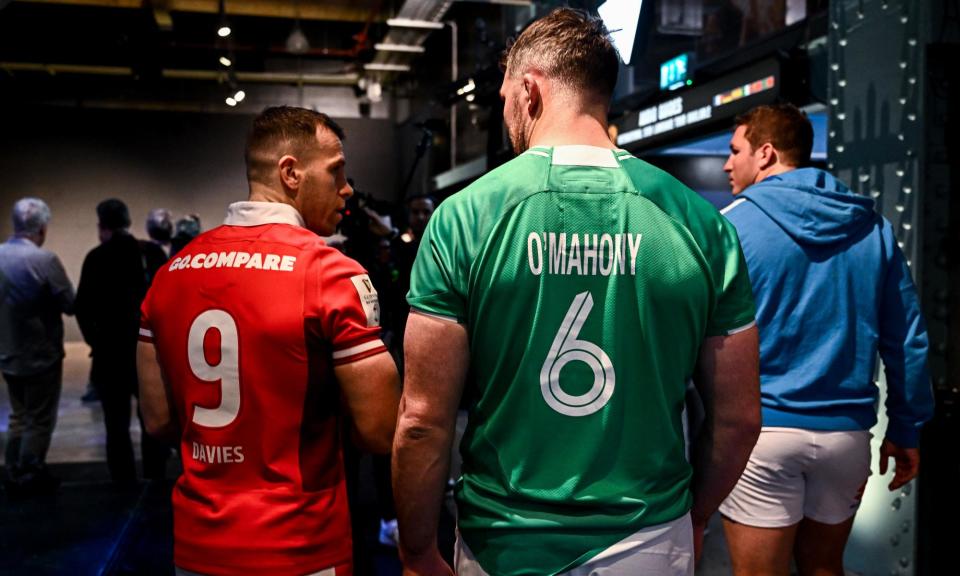Winds of change blow through Six Nations to spark new sense of purpose

The 2024 Six Nations championship has already started with a whoosh. The gale‑force impact of Storm Isha certainly did a grand job of complicating the tournament launch, forcing coaches, players, administrators and hacks to rip up their travel plans and reminding everyone of rugby’s place in the universe. The players may be huge nowadays but there are even bigger forces of nature out there.
For those who did somehow manage to land in the correct city and make it to the Guinness Storehouse in Dublin, however, there was still plenty of interest. The immediate aftermath of a World Cup is always a fascinating period, particularly this time around. One glance at the new captains about to take charge of their respective nations – from England’s Jamie George and Ireland’s Peter O’Mahony to Wales’s new 21-year-old captain, Dafydd Jenkins – reinforces the collective fresh sense of purpose every nation is trying to generate.
Related: ‘We haven’t performed’: Borthwick tells England to ignite revival in Six Nations
No longer is Johnny Sexton on hand to make Ireland feel instantly more confident and composed. Antoine Dupont, France’s talisman, is off to represent his country at the Paris Olympic sevens instead. England’s Owen Farrell will not be available, either. Nor will the gridiron‑bound Louis Rees‑Zammit. The Netflix camera crews, back to collect more fly‑on‑the‑wall documentary footage, will have to find some new faces.
At first glance the two sides best insulated from these gusting winds of change should be France and Ireland. Both performed to a level above the rest at the World Cup, even if neither made it beyond the quarter-finals. And, as Ireland’s Andy Farrell made abundantly clear, the loss of Sexton and one or two others does not necessarily mean the whole enterprise has to be summarily dismantled.
“Is this a new start?” asked Farrell rhetorically. “It’s not because of everything we’ve been through. We want to continue to grow and you don’t do that by just cutting the legs off it. Competition for places is premium and it has to stay that way. I don’t buy into all the talk of a four-year cycle that tends to come around when World Cups are finished.”
Compare and contrast with Warren Gatland, about to enter his 17th Six Nations campaign with Wales and a past master at confounding people’s expectations. In Gatland’s view the rebuilding process has to start now – “It’s definitely about thinking about the future, not just for this World Cup cycle but the next one” – without entirely losing sight of the here and now. “It doesn’t mean we’re not taking this competition seriously … that first game against Scotland is incredibly important.
“Get off to a good start and we can go to Twickenham without too much fear. We can absolutely win this tournament. It has always been the case with Wales that you write us off at your peril. Do that and you could be caught with your pants down.”
Scotland and Italy will be thinking much the same, with the Scots also under new leadership in the contrasting shape of the co‑captains Finn Russell and Rory Darge. If Darge is not quite fit and ready for the opening Wales game it will be the in-form Russell calling the shots, with everyone attached to the Scottish camp determined to atone for a World Cup which promised much without, in the end, delivering a great deal in the way of tangible reward.
France, with Grégory Alldritt taking over from Dupont and Maxime Lucu primed to wear the starting No 9 jersey, also need no reminding that their heavyweight opening Friday night fixture against Ireland in Marseille will go a long way towards shaping their destiny. It is a blow, even so, to have lost the popular flanker Anthony Jelonch, who has sustained another serious knee injury and will now be out for several months.
Then there is England, now seeking another change of gear having battled their way to a bronze‑medal finish at the World Cup. George, Farrell’s successor as captain, is not even attempting to sugarcoat England’s modest recent Six Nations achievements. “The stats don’t lie, do they? I’ve been a part of those performances and I guess they haven’t been good enough, especially our home form. To have that sort of record at home, at Twickenham – a place we love playing at and a place we want to make a fortress – is hugely disappointing.”
Most telling of all, perhaps, will be which of the promoted captains and newly recruited coaches makes a critical impact. Gatland reckons Exeter’s Jenkins, the second-youngest Welsh captain in history after Sir Gareth Edwards, has a potential touch of the Alun Wyn Joneses and Lawrence Dallaglios about him, while Steve Borthwick and George are already talking in glowing terms about Felix Jones, their new Irish coaching recruit last seen helping South Africa to attain World Cup glory.
“Felix is one of the most intense people I’ve ever met, which is saying something,” Borthwick said. “This guy … I don’t know if he sleeps.” George is already confident that England’s defence, Jones’s specific area of responsibility, will be significantly more proactive. “I have had one meeting and I know for a fact the England defence is going to take a lot of time and space away from an opposition. How aggressive we’re planning on being is hugely exciting. When you add that to the calibre of players we have at our disposal, it’s going to be an amazing Six Nations.”
The airport chaos on Sunday night may have physically stopped George from crossing the Irish Sea but, along with every other Six Nations aficionado, he already has a soaring sense of anticipation.
This is an extract taken from our weekly rugby union email, the Breakdown. To sign up, just visit this page and follow the instructions.

